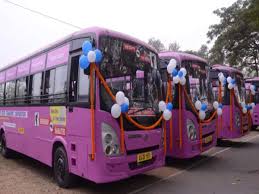JDU introduced women-only ‘Pink Buses’ to enhance safety, empowerment, and accessibility ahead of Bihar elections.
NEW DELHI: The Janata Dal United (JDU) is actively preparing for the upcoming Bihar Assembly elections, slated for October-November this year. As part of its election strategy, the party has begun implementing plans aimed at strengthening its core voter base. In a key move to garner support from women and children ahead of the polls, the Nitish Kumar-led NDA government launched a dedicated fleet of women-only “Pink Buses” starting this June.
These buses will operate not only in the state capital, Patna, but also in other major cities such as Bhagalpur and Muzaffarpur. The initiative aims to provide a safer, more dependable, and easily accessible mode of public transportation for female commuters, including students and working women.
The initiative is expected to greatly benefit daily commuters—both students and working professionals—by offering a more affordable and safer alternative to existing transportation options. Each bus will have 25 seats and come equipped with advanced safety features, including CCTV cameras, panic buttons, charging ports, and microphones, all of which can be centrally controlled by the driver. Significantly, the scheme also aims to create employment opportunities for women by appointing female drivers and conductors to run the service.
Rajeev Ranjan, JDU National Spokesperson and senior party leader, told The Sunday Guardian that the Pink Bus initiative marks a landmark moment in enhancing public transportation for women in Bihar. He emphasised that the scheme is not just about commuting, but about empowering women, ensuring their safety, dignity, and independence. Ranjan reiterated that the Pink Bus Scheme, announced as part of the state’s 2025–26 budget, includes buses outfitted with multiple security and convenience features, all of which can be controlled by the driver from their seat.
He also highlighted the inclusive nature of the scheme, pointing out that women drivers and conductors would be central to its operation. He added that the initiative is not limited to Patna alone. Plans are in motion to extend the Pink Bus service to other major cities, including Bhagalpur, Purnia, and Muzaffarpur, in the next phase. This expansion will be overseen by the Bihar State Road Transport Corporation (BSRTC). According to him, the project will play a crucial role in bridging the accessibility gap for women in education and employment, thus contributing to their economic independence and empowerment.
A political analyst closely observing the dynamics of Bihar’s politics remarked that Kumar has always displayed astute political judgment and timing. He said the Chief Minister enjoys a strong rapport with the women of Bihar, comparable to the connection Shivraj Singh Chouhan shares with women in Madhya Pradesh. Since the imposition of the liquor ban in Bihar, women have consistently supported Kumar, who has continued to introduce various welfare schemes aimed at empowering them.
By unveiling the Pink Bus scheme just before the elections, the JDU supremo has once again demonstrated his political acumen in consolidating support from women and student voters—segments that could prove pivotal in the forthcoming Bihar Assembly elections.
A party insider revealed that the Pink Bus service is set to connect major landmarks, including leading women’s colleges, workplaces, and crucial locations such as IGIMS. As of now, five routes have been finalised. The buses will operate daily between 7 am and 8 pm, with a fleet of 20 CNG-powered vehicles. The scheme will offer budget-friendly monthly passes, priced at Rs 400 for female students and Rs 550 for working women. Additionally, single-journey fares will range from Rs 6 to Rs 25, depending on the travel distance.

